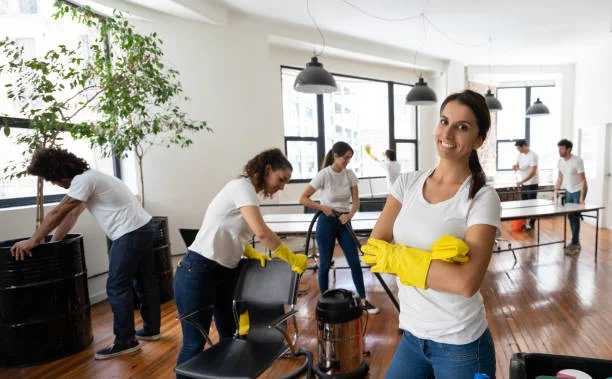The Science Behind Clean Spaces and Clear Minds
Picture this: You walk into your workspace Monday morning, coffee in hand, ready to tackle that massive project. But instead of diving in, you’re distracted by last week’s dust accumulation, that mysterious sticky spot on your desk, and papers scattered like confetti after a particularly enthusiastic celebration, notes BanCal Properties solutions.
Your brain just spent valuable processing power on environmental chaos instead of actual work.
Turns out, this isn’t just annoyance – it’s neuroscience. Our brains constantly process environmental stimuli, and clutter creates competing signals that divide attention. Clean, organized spaces allow cognitive resources to focus where they actually matter. Regular professional cleaning doesn’t just remove dirt; it removes mental obstacles you didn’t even realize were draining your energy.
Research consistently demonstrates the connection between environmental cleanliness and cognitive performance. According to studies from the University of Arizona, employees in clean, well-maintained offices demonstrate up to 15% higher productivity compared to those working in cluttered conditions. That’s not a small margin – that’s the difference between meeting deadlines comfortably and scrambling desperately at 11:47 PM.
The relationship extends beyond simple distraction. Clean environments actually reduce cortisol levels – that pesky stress hormone that makes you feel like you’re perpetually running late to something important. Lower stress means better decision-making, improved creativity, and the ability to actually remember where you put your keys.
Your Immune System’s Best Friend
Let’s talk about something genuinely unsettling: germs throw parties in your space, and you’re funding the entire operation without even knowing it.
Every surface you touch throughout the day collects bacteria, viruses, and other microscopic freeloaders. Doorknobs become germ highways. Kitchen counters transform into bacterial nightclubs. That keyboard you’re typing on? In online sources, people write that it harbors more pathogens than most toilet seats – a fact that probably just made you want to douse your hands in sanitizer.
Regular professional cleaning services function as your immune system’s backup team. They target high-touch surfaces with hospital-grade disinfectants, breaking the transmission chains that turn offices into illness incubators. The result isn’t just theoretical – it’s measurable in reduced sick days and lower healthcare costs.
More than 50 million Americans battle allergies every year, ranking allergies as the sixth leading cause of chronic illness nationwide. Dust mites, mold spores, pet dander, and pollen accumulate relentlessly in carpets, upholstery, and HVAC systems. You can vacuum until your arms ache and still barely scratch the surface of what professional-grade HEPA filtration systems capture.
Consider the full article on how systematic cleaning protocols address allergen accumulation at its source, preventing respiratory issues before they develop into chronic conditions.
What Lurks in “Clean Enough” Spaces
Here’s where things get uncomfortable. Most people maintain what they consider “clean” spaces – they wipe surfaces, vacuum occasionally, maybe mop when things get sticky. But surface cleaning misses entire ecosystems of problems.
Behind appliances, mold quietly establishes real estate. Inside air ducts, years of dust compress into felt-like layers that recirculate throughout your space with every HVAC cycle. Under furniture that hasn’t moved since the previous decade, allergens accumulate into concentrations that would horrify you if visible to the naked eye.
Professional cleaning services don’t just address what you see – they systematically eliminate what you can’t see but definitely breathe. That matters more than most people realize until they experience the difference firsthand.
Common hidden health hazards include:
- Mold growth in moisture-prone areas like bathrooms and basements
- Bacterial colonies in kitchen sponges and cutting boards
- Dust mite populations in mattresses and upholstered furniture
- Allergen accumulation in carpet fibers and window treatments
- Chemical residue buildup from improper cleaning product use
The Productivity Paradox Nobody Talks About
Want to hear something that sounds backwards but isn’t? The time you spend cleaning actually costs you more than hiring professionals – even when factoring in the service fees.
Average Americans dedicate 30-60 minutes daily to basic cleaning tasks. Weekly deep cleaning adds another 2-4 hours. Monthly projects pile on more time. Annually, you’re investing somewhere between 200-400 hours maintaining your space. That’s literally 5-10 full work weeks spent scrubbing, organizing, and trying to remember which cleaning product goes with which surface without causing permanent damage.
Now calculate what those hours are worth. If you earn $25 hourly, that’s $5,000-10,000 annually in opportunity cost. Could you use that time more productively? Learn skills that increase earning potential? Spend time with family? Sleep more than five hours per night?
As Gandhi wisely noted, “I will not let anyone walk through my mind with their dirty feet.” The philosopher meant it metaphorically, but it applies perfectly to how environmental disorder invades mental space. Every minute spent worrying about cleaning tasks is a minute stolen from more valuable pursuits.
According to workplace research, 94% of employees report heightened productivity in clean environments, while 77% claim their work quality improves in well-maintained spaces. For businesses, this translates directly to bottom-line impact. Companies prioritizing regular professional cleaning see:
- Reduced employee absenteeism due to illness
- Higher quality output from focused workers
- Improved employee morale and job satisfaction
- Better client impressions during meetings and visits
- Extended lifespan of expensive office equipment and furniture
The numbers don’t lie – investment in professional cleaning generates measurable returns that far exceed the service costs.
Mental Health Gets a Makeover
Depression, anxiety, and stress don’t exist in vacuums – they respond to environmental factors. Living or working in chaotic, dirty spaces amplifies negative mental states. The relationship works both ways: mental health struggles make maintaining cleanliness harder, which worsens mental health, creating vicious cycles that feel impossible to break.
Professional cleaning services interrupt these cycles. Coming home to a genuinely clean space after a difficult day provides psychological relief that shouldn’t be underestimated. You’re not walking into reminders of tasks undone or failures to maintain basic standards. Instead, you’re entering a sanctuary that actually feels restful.
Stress Reduction Through Environmental Control
Life delivers plenty of uncontrollable chaos. Work deadlines shift unexpectedly. Relationships get complicated. Global events spiral in directions nobody predicted. Your living space doesn’t need to contribute to that chaos – it can serve as the controllable element providing stability when everything else feels uncertain.
Regular cleaning services establish predictability. You know when cleaners arrive. You know what gets done. You know the standard maintained. That consistency creates psychological anchoring that benefits mental health more than most people realize until experiencing it.
Robert Sapolsky observed that “literal cleanliness and orderliness can release us from abstract cognitive and affective distress.” During overwhelming periods, clean spaces provide the mental breathing room necessary to process difficult situations without additional environmental stressors compounding problems.
The Compounding Effect of Consistency
Here’s what separates regular professional cleaning from occasional deep cleans: consistency creates compounding benefits that one-time efforts never achieve.
Surfaces cleaned regularly don’t develop the stubborn buildup requiring aggressive chemicals and intense scrubbing. Carpets maintained consistently last years longer than those cleaned sporadically. Air quality remains stable rather than oscillating between decent and problematic.
Think of it like physical fitness. Working out intensely once monthly won’t build the fitness that moderate exercise three times weekly creates. Same principle applies to environmental maintenance – regular attention prevents problems rather than constantly fighting accumulated damage.
The consistency advantage manifests as:
- Longer lifespan for carpets, furniture, and appliances
- Sustained air quality preventing chronic respiratory issues
- Reduced need for expensive deep cleaning interventions
- Maintained property values through proper upkeep
- Prevention of pest infestations before they establish
Professional services operating on regular schedules catch small issues before they become expensive disasters. That water spot noticed during routine cleaning? Addressed immediately instead of ignored until ceiling damage requires contractor intervention. The early mold growth spotted during regular inspection? Eliminated before it spreads throughout your HVAC system.
Prevention costs significantly less than remediation – always has, always will.
The takeaway? Regular professional cleaning services deliver interconnected benefits that improve both health and productivity through mechanisms most people never consciously recognize. Cleaner air reduces illness. Reduced illness increases productivity. Increased productivity reduces stress. Reduced stress improves mental health. Better mental health makes life more enjoyable.
It’s not magic – it’s systematic environmental management that creates cascading positive effects across multiple life domains. The question isn’t whether regular cleaning helps; it’s whether you’re ready to stop fighting unnecessary battles against dirt, germs, and disorder that professionals handle far more effectively anyway.






